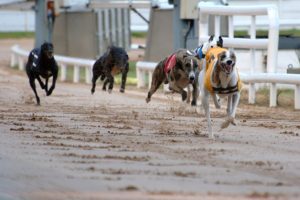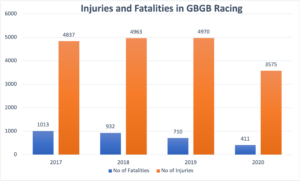Is Greyhound racing close to being phased out in the UK?

The fluorescent rabbit begins its journey. A gun fires, the greyhound fly from the traps, legs start running, it is focussed and fast.
The group exit the final bend before a winner narrowly emerges from the pack and crosses the line, the thrill of another close race.
But the stands are half empty. A few people can be heard celebrating a win while others throw their bet slips to the ground, adding to years of money lost at the dogs, and better times with it.
Once a popular night out and part of British culture, Greyhound Racing has been in gradual decline, but is it beyond the point of no return?
The sport’s popularity covered large ranges of people, from stag and hen dos to greyhound regulars who had been going for years.
A regular passtime for friends, the UK at one point had around 250 tracks, now only 21 tracks licensed through the Greyhound Board of Great Britain (GBGB) remain.
One of the three unlicensed tracks, Valley Greyhounds, which is the last remaining track in Wales faces a turbulent year, with its future being called into question.
A petition to ban Greyhound Racing in Wales has now passed the committee stage, and will be debated in the Welsh Senedd in due course, putting further pressure on the Valley.
The licensing of The Valley
The Valley has recently been taken over by Dave Barclay, who is the owner and promoter of Harlow Racecourse, Essex.
Mr Barclay hopes to turn The Valley into a licensed GBGB track. This would mean an increased demand for races and the streaming of these races.
Mr Barclay has said that they could see races go up from one to four times a week, as early as 2023.
Being a licensed track does mean that certain welfare standards must be met, which currently are not a requirement for independent tracks.
The Welsh Government have also announced a five-year animal welfare plan, that may hold off calls to ban the sport until it is clear if this plan sees an improvement in dog deaths and injuries.
Petitions and public support to ban greyhound racing
Despite the takeover and possibility of becoming part of the GBGB, the Valley faces a fight away from the track.
A petition to ban greyhound racing in Wales has reached over 35,000 signatures – more than three and a half times the amount needed for it to be debated in the Welsh Senedd.
The petition has cross-party political support, with the Counsel General of Wales, Mick Antoniw, and Leader of the Welsh Liberal Democrats, Jane Dodds, both publicly supporting it.
I support @HopeRescue‘s campaign to ban #greyhoundracing in Wales.
The injuries, deaths and high number of ‘surplus’ dogs created by the greyhound racing industry are unacceptable.
Not all hounds are as lucky as Eddie and Elsie here, who now have a loving home.#greyhoundfriend pic.twitter.com/epRKb4V65z— Mick Antoniw MS/AS 💙 (@MickAntoniw1) October 19, 2021
The support is not just exclusive to Wales and shows the broader viewpoint about Greyhound racing.
In the past two years, two separate petitions, one in the UK, and one in Ireland, have received over 100,000 signatures each calling for bans.
Hope Rescue
Hope Rescue are the charity petitioning for the ban, after working at the Valley Track and seeing the issues first hand.
A spokesperson from Hope Rescue said:
“We worked with Valley’s track for three years. During that time, the level of injuries and other welfare issues we saw, after a while it felt as though we were facilitating that.”
The charity named themselves after a greyhound that was found and rescued a few years ago. They said:
“We are actually named after a greyhound called Last Hope, who was found on a mountain in South Wales. He had his ears cut off and had been shot with a bolt gun but was still alive.”
The charity takes in around a quarter of the stray dogs in Wales. Post-pandemic, rescue centres have been under even more pressure as a surge in dogs purchased during lockdown has led to an increase in the number been given up to rescue centres.
Hope Rescue want to see a more sustainable and strategic plan for greyhounds, with nearly 5,500 dogs entering Greyhound Trusts or Charities each year for rehoming after they retire.
“Whilst GBGB promote their rehoming and injury recovery schemes as welfare improvements, the real welfare issue is why so many dogs are getting injured in the first place.
It’s a man-made welfare crisis that simply wouldn’t exist if greyhound racing was banned. The foundation of any animal welfare strategy is prevention is better than cure.”
Hope Rescue believe that a ban could be achieved in Wales, with the rest of the UK needing to phase the sport out due to the number of tracks.
Their petition passed the 10,000-signature mark early on, but they wanted to continue getting signatures to send a clear message to the Welsh Government.
The petition passed the committee stage on 7th March, and will now be taken forward to a full debate in the Senedd.
The case of Bling Bling Chip
One of the stories that illustrates the darker side of Greyhound Racing relates to the treatment of a dog called Bling Bling Chip.
The owner had been suspended from various GBGB tracks after he was found to have doped Bling Bling Chip to make the dog race slower and in return, enhance the odds.
Bling Bling Chip then won as an outsider after being taken off the drug, resulting in large winning for anyone who had bet on the dog.
The trainer was eventually banned, but before that, three of his dogs were taken in by Hope Rescue with broken legs after racing at the Valley.
One of the dogs died due to post surgery complications.
The view of a trainer
The petitions focus on the safety of the dogs, however David Mitchell, the co-founder of Blue Tick Syndicate, feels that technology and communication are important to the welfare of his greyhounds.
He said:
“I communicate pretty much daily with my trainer regarding the care of my greyhounds. Whether that’s their diet, any treatments, physio, hydrotherapy, vet check-ups.”
Mr Mitchell has a hands-on approach:
“I take my greyhounds out for a walk and the odd treat. You learn about them, their personalities, likes and dislikes. Greyhounds are incredibly loving and have great characters.
He said that technology allows himself and the trainers to get closer to the greyhounds by analysing photos and videos of them.
Mr Mitchell also said dogs that are purchased have a retirement plan in place before they run their first race.
Blue Tick Fern the pocket rocket with a heart of a lion has officially retired today. We’ve taken the decision that now is the right time to send her to the breeding paddocks. She’s been a fantastic racer for the syndicate and we can’t wait to see her become a mum 💙 pic.twitter.com/YnTSU9WG5H
— Blue Tick Syndicate (@bluetickracing) December 2, 2021
A lot of the time, Blue Tick Racing rehome their dogs through their members, members’ family, or via the Greyhound Retirement Scheme.
What do the stats tell us?
Each year, the GBGB publish their own figures about injuries and retirements of greyhounds that race on their own licensed tracks.
These figures only date back to 2017, but they show a consistent trend amongst the three full years of racing before the pandemic affected racing in 2020.

It is difficult to note what this data means, as the GBGB only provide the number of dog runs, not the number of individual dogs that race.
A dog racing once a week for a year will contribute to 52 dog runs, with the figures above not including figures from independent tracks.
Across the three full years, there were on average around 420,000 dog runs.
The latest published figures, from 2020, show that a total of 411 dogs died, with 200 of these described as ‘Humane Grounds at Racecourse’, and in 2019, with racing unaffected by Covid-19, there were 710 deaths, and 4,970 injuries.
In 2018, Chris Luffingham, director of campaigns at the League Against Cruel Sports addressed the statistics, even though they had started to decrease.
He said:
“Dog lovers around the country will be asking if one dead dog is too much to pay for a sport which is solely designed to give people something to bet on. Can this industry possibly justify 1,000 fatalities – a quarter of which actually took place at the track side? No they cannot.”
When will a resolution be found?
The petition passing the committee stage is a big step towards either a ban, or sanctions being placed, and although a date for the debate is unknown, the wheels are in motion.
With the cross-party support, the petition will have the backing of various members of the Senedd in the debate, however the general feeling towards a ban in Wales is unknown.
The Valley are continuing with plans to improve the track to gain a licence, which will more than likely be in 2023/2024.
The next 12 months will be key in finding a resolution to the future of Greyhound racing within Wales with both sides of the debate.